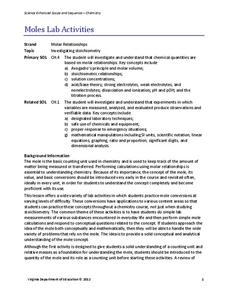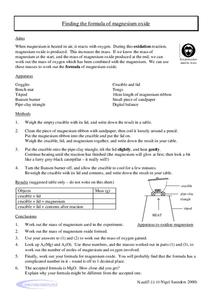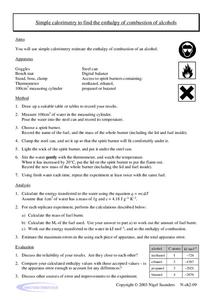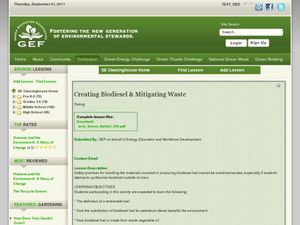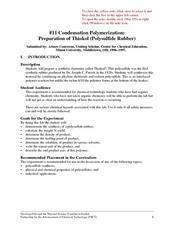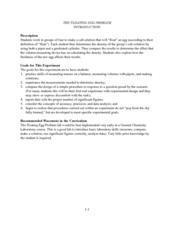eGFI
Crystal Study
Diamonds are a girl's best friend! Crystal labs can be a science teacher's best friend because watching crystals develop is fascinating, and it results in such a pretty product! This activity is unique because the crystals are grown...
Curated OER
Moles Lab Activities
General chemistry class members engage in a mini-unit on mole conversions. Through nine lab activites with varying degrees of difficulty, they practice measuring mass and volume, molar calculations, and stoichiometry. Terrific...
Creative Chemistry
Displacement Reactions of Metals
Chemistry stars experiment with metals to observe reactivity with salt solutions. They test magnesium, zinc, iron, and copper by immersing them into different solutions and observing for changes. A separate set of data tables is...
Creative Chemistry
Comparing the Degree of Unsaturation of Margarine with that of Butter
Is butter better? In terms of saturation, young chemists find out! Using titration methods, they will compare the degree of saturation of butter with that of margarine. Knowing the unsaturation, they can make conclusions about the...
Creative Chemistry
What is the Percentage of Copper in "Copper" Coins?
Whether in the UK or the US, the mass of the copper in a copper alloy penny can be determined. If you are in the US, note that on the lab sheet, a penny is identified as a "1p piece." The penny is dissolved by young chemists in nitric...
Curated OER
The Effect of Dissolved Salt on the Boiling Point of Water
Explore the properties of solutions with a lab activity. Chemistry fans determine the boiling point of water, add salt to create a solution, and then repeat the process four more times. They design their own data table and then graph the...
Curated OER
Finding the Formula of Magnesium Oxide
Rather than simply matching up the ionic charges on paper, this exercise gets chemists into the lab to determine the chemical formula for magnesium oxide! If a known amount of magnesium is used, an oxidation reaction results in this...
Creative Chemistry
Displacement Reaction of the Halogens
This publisher has put out some terrific laboratory activities for your aspiring chemists! This edition uses displacement reactions to develop a reactivity series for three halogens. Not only do they explore the reactivity of bromine,...
Creative Chemistry
Simple Calorimetry to Find the Enthalpy of Combustion of Alcohols
Accomplished chemistry learners set up a calorimeter and measured the energy released by various alcohols: methanol, ethanol, and either propanol or butanol. Lab masters will first need to design their tables for recording data. Consider...
Creative Chemistry
Displacement Reactions of the Halogens
During this lab activity, chemists discover the reactivities of chlorine, bromine, and iodine as examples of the halogens. They use a displacement reaction as a test by adding other compounds and observing for a color change. The lab...
Curated OER
Creating Biodiesel and Mitigating Waste
Biotechnology pros produce their own biofuel using waste oil and fresh vegetable oil. They test the quality of their product using titration techniques and pH analysis. They write their observations and report their findings. Be aware...
Curated OER
Dental Chemistry Analogy
After taking in background information on teeth, marble, eggshell, and fluoride, chemistry aces design an experiment. Their goal is to demonstrate whether or not fluoride has a similar effect on marble or eggshell as it does on tooth...
Curated OER
Introduction to Photovoltaic Systems
The Green Education Foundation found that this lesson plan, written by the Texas State Energy Conservation Office, is right up their alley when it comes to teaching sustainability. It is ideal as a first lesson plan on photovoltaic...
Serendip
Is Yeast Alive?
Through two investigations, life science learners determine whether or not yeast is alive. They perform tests for metabolism by providing sugar and observing if gas is produced as a byproduct. They incubate some of the sample for at...
Curated OER
Using the Spectrophotometer to Analyze a Mixture
General chemistry classes practice spectroscopy. They grasp the relationships between wavelength, absorbance, and solution concentration. Additionally, they gain valuable practice using laboratory equipment such as burets and pipettes....
Curated OER
Condensation Polymerization: Preparation of Thiokoll® (Polysulfide Rubber)
This lab activity is geared toward experienced chemistry learners, in particular, those who are familiar with organic chemistry. They will create a synthetic elastomer and then make observations and measurements of its different...
Curated OER
The Visible Spectroscopy Expert Witness Problem
In a simulated crime science investigation, chemistry or physics sleuths use spectroscopy to analyze solutions. The lesson gives learners practice making salicylate solutions, using spectrophotometers, calculating dilution amounts,...
Curated OER
The Floating Egg Problem
This is the grown-up version of the classic "float an egg in salt water" experience, plus an experiment in soap making. High schoolers explore density, but more importantly, practice accuracy, precision, and the use of significant...
Curated OER
Aluminum Adventure
Chemistry aces use an electrochemical cell to anodize a strip of aluminum. They apply an organic dye to it. In a practical application, they design a piece of jewelry out of the anodized metal and describe the process. Thorough notes...
Curated OER
Programming the "Rinse Robot"
Experienced chemistry technicians use then layer chromatography to discover how much of a free compound is left after each rinse cycle. Where this could obviously be used as a practice with chromatography technique, it can also be used...
Curated OER
The Influence of Initiator Concentration on the Molecular Weight of Polystyrene
This in-depth organic chemistry lab walks learners through an investigation of the effect of initiator concentration on the resulting molecular weight of polystyrene. It is important that you use this lesson with experienced chemistry...
Curated OER
Condensation Polymerization: Preparation of Two Types of Polyesters
College-level or AP chemists use phthalic anhydride to synthesize two different polyesters, one linear and one cross-linked in structure. A detailed materials list and well-written procedures are provided on a lab sheet. Learners write...
Curated OER
Enzymes Help Us Digest Food ~ Introduction to Sugars and Enzymes
After an explanatory introduction to sugars and enzyme activity, biochemists discover whether lactase is needed to digest lactose, sucrose, and milk as a whole. High school science lab skills are required for these investigations.
Curated OER
Supernova Chemistry
Using spectroscopes, high school astronomy, physics, or chemistry learners observe emission spectra from several different sources. This stellar NASA-produced lesson plan provides terrific teacher's notes and a student handout. Make sure...



